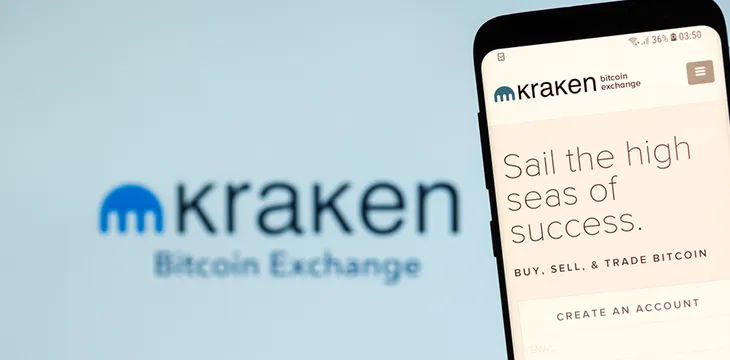|
Getting your Trinity Audio player ready...
|
Kraken CEO Jesse Powell slammed the recent U.S. Treasury sanctions on Tornado Cash as “unconstitutional” and said the takedown of the project’s GitHub was “not necessary” in a recent interview with Bloomberg.
The outspoken exchange boss said “people have a right to financial privacy” and that he doesn’t believe the sanctions will stand up to legal challenges. He joins Uniswap inventor Hayden Adams and a chorus of other digital currency advocates in condemning the sanctions.
Nonetheless, Kraken complied
While Powell and other proponents of so-called ‘decentralized’ technologies publicly condemned the Tornado Cash sanctions, they nonetheless fell in line and compiled immediately. Kraken blocked Tornado Cash addresses, and Uniswap blocked 250 addresses believed to be linked to the mixer as Dutch police swooped in and arrested its developer.
It’s yet more evidence that, loud as they may protest, the leaders of the industry understand that code is not really law and that disobeying sanctions laid down by the world’s most powerful government could have drastic consequences.
Powell defends the disenfranchised and financial privacy
Financial privacy and liberty are popular concepts in the digital currency industry. So it’s no surprise that Powell summoned these concepts in his public condemnation of the U.S. Treasury sanctions.
Powell told Bloomberg that he and his fellow advocates for boundless freedom were “trying to educate regulators and law enforcement” on the benefits of digital currency.
“It’s a tough challenge now. It’s why we have these conversations going on all the time. We are really trying to educate regulators and law enforcement and the lawmakers about the real risks here and about the real need for financial privacy and who cryptocurrency really serves,” he said.
It’s unlikely that regulators, law enforcement, and lawmakers will be sympathetic to Powell’s pleas, given that the two largest users of Tornado Cash were allegedly the North Korean government and a prominent human trafficking ring. This highlights how the idealistic thinking in ‘Magical Crypto Land’ is completely divorced from reality.
Powell also claimed that the digital currency industry is helping people in developing countries who don’t have access to financial services.
“Beyond that, this speculative use case here in the United States, it’s really helping people all over the world who have less access to financial services. There are billions of people in the world that don’t have access to a bank account, so crypto is really for those people first and foremost,” he noted.
While the sentiment here is commendable, it’s unclear how most of these people, who live on less than $5.50 per day, could afford the fees associated with exchanges like Kraken or transactions on broken blockchains like BTC or Ethereum. If only Powell mbraced Satoshi’s original electronic cash system, he might have a valid argument.
Displaying his tone-deafness even further, Powell claimed that “Getting around government controls around the monetary system is a sort of secondary benefit that you see come into play in cases like Canada where they’ve shut down the bank accounts of protesters. That’s the kind of scary thing we hope you don’t see here in the United States, but that’s another kind of insurance policy that cryptocurrency and Bitcoin specifically provides.”
Clearly, it hasn’t sunk in with Powell yet that the world’s most powerful governments are not happy with systems that attempt to get around their controls and that this sort of rhetoric will do him and his business no favors in the coming era of regulation. While it is undoubtedly true that governments can and do overreach with their controls at times, pitching your vision and product as one that helps get around these controls is not smart.
All in all, Powell’s rhetoric is just more pie-in-the-sky idealism from clueless diehards with not one ounce of common sense between them. While the vision Powell touts appeals to the yearning for freedom innate in the human soul, the reality is that such a world would enable and embolden despot governments and human traffickers, as Tornado Cash clearly shows. It’s unclear how any degree of freedom would survive if such authoritarian governments and criminal entities became even more powerful without restrictions on their activities. Thus, Powell’s argument logically defeats itself.
Bitcoin was designed to work within the rule of law and help the world’s poorest
The mess created by advocates of the nonsense touted in the ‘crypto’ industry is but a passing phase, a mistake that is being corrected. None of this madness was ever intended, and Bitcoin was never designed to facilitate it. As Satoshi Nakamoto has explained repeatedly, Bitcoin is the antithesis of the anarchist’s dream currency, bringing about a more honest system with full traceability.
This may not be to the linking of Jesse Powell and others of his ilk, but it is nonetheless the truth and is for the best. Bitcoin will bring about a situation where those in the developing world, which Powell claims to represent, will have a real chance to trade globally with almost zero fees. These are the “small, casual transactions” Satoshi wrote about in his white paper and repeatedly mentioned in his emails and forum posts. These transactions will have full traceability, bringing about a world that is the polar opposite of what money-laundering tools like Tornado Cash create.
Stay out of trouble because Powell’s idealism won’t save you
As Silk Road boss Ross Ulbricht learned the hard way, you don’t actually have to be the one committing the crimes on the ground to end up in serious trouble—facilitating them is enough to have life-altering consequences.
It’s time for everyone involved in the industry, including both developers and users, to wake up and realize how serious all of this is and just how much trouble it can land them in.
As the Tornado Cash developer also learned the hard way, ideals like financial privacy and decentralization don’t help when the door comes crashing in.
Follow CoinGeek’s Crypto Crime Cartel series, which delves into the stream of groups from BitMEX to Binance, Bitcoin.com, Blockstream, ShapeShift, Coinbase, Ripple,
Ethereum, FTX and Tether—who have co-opted the digital asset revolution and turned the industry into a minefield for naïve (and even experienced) players in the market.

 09-16-2025
09-16-2025 





